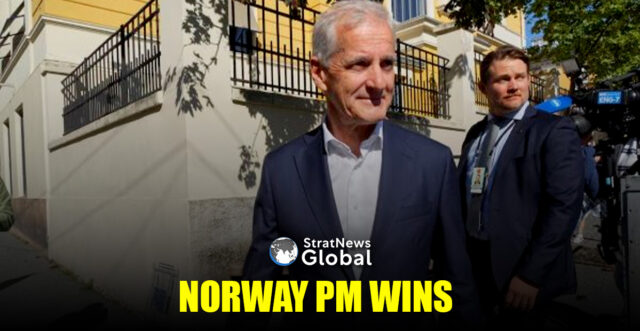Norwegian Prime Minister Jonas Gahr Stoere has won re-election in a tightly contested parliamentary vote, holding on to power despite years of cabinet unrest and internal revolt within his ruling Labour Party.
Struggling with high inflation and rising interest rates that drove up the cost of living, Stoere’s first term was also marked by several ministerial resignations over scandals such as tax evasion, undisclosed share trading and ethics breaches.
As Labour plunged in the polls, Stoere, 65, survived a leadership challenge in early 2025 by reshuffling the cabinet, naming as finance minister his close friend and ally Jens Stoltenberg, a popular former NATO chief and ex-prime minister.
Support For Stoere
The reshuffle, which included purging the rural-based Centre Party from the government, coincided with the start of U.S. President Donald Trump’s second term, shifting many voters’ attention towards foreign policy and security.
“I think it really is incredible how the support for Stoere has changed,” Johannes Bergh, head of the national election studies programme at the Oslo-based Institute for Social Research, told foreign correspondents last week.
“I think Stoere hasn’t changed, but the circumstances have changed, and people are valuing his experience and competence in dealing with international issues,” Bergh said.
Born into a wealthy family and earning his university degree at Sciences Po, one of France’s top universities, Stoere in 2014 became an unlikely leader of Norway’s left-wing Labour, the traditional home of the working class.
After he first considered joining the Conservative Party, Stoere in his late-20s took a job with Labour, having skipped the traditionally formative period of youth-wing membership that has moulded other senior members of the party.
Russia Deal
Stoere worked closely with Norway’s first female prime minister, Gro Harlem Brundtland, and was later her chief of staff at the World Health Organization.
In 2010, as foreign minister in Stoltenberg’s government, he secured an end to a four-decade-long offshore Arctic border dispute with Russia, and was later named health minister, a key domestic policy job.
In its latest election campaign Labour emphasised Stoere’s foreign policy skills, presenting him as a safe pair of hands in meetings with Trump and in handling relations with the European Union, of which Norway is not a member.
As party leader Stoere overcame a 2017 election defeat, and four years later unseated a Conservative-run coalition, leading a centre-left landslide with a promise of tax relief for low and middle income families and cutting the cost of public services.
But as Norway’s annual rate of inflation hit 7.5% in late 2022, the highest in decades, while the central bank’s policy interest rate soared to 4.5% the following year, a level last seen in 2008, the government’s support quickly eroded.
Inflation has since eased, however, to an annual rate of 3.3% in July this year, while the central bank in June cut interest rates for the first time in five years, boosting consumer confidence.
The election result still leaves Stoere dependent on four smaller left-leaning parties in parliament, up from two currently, making it harder to govern.
(With inputs from Reuters)





